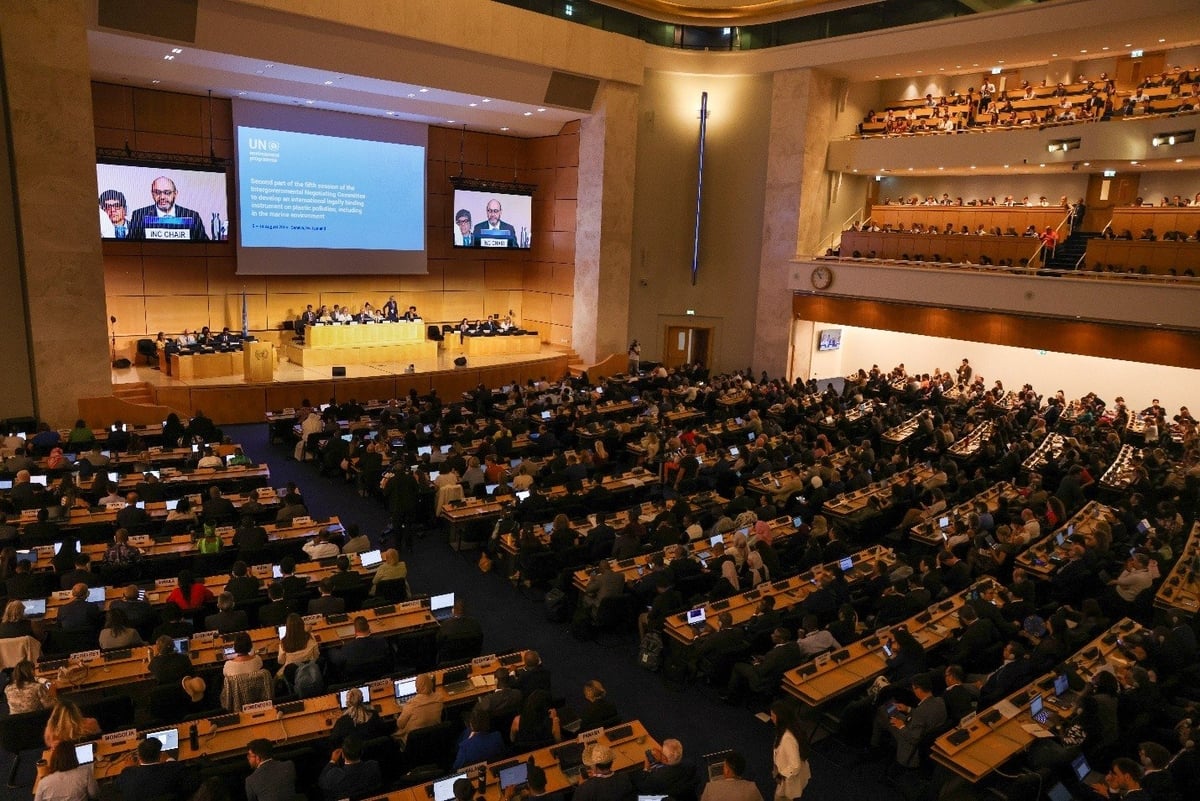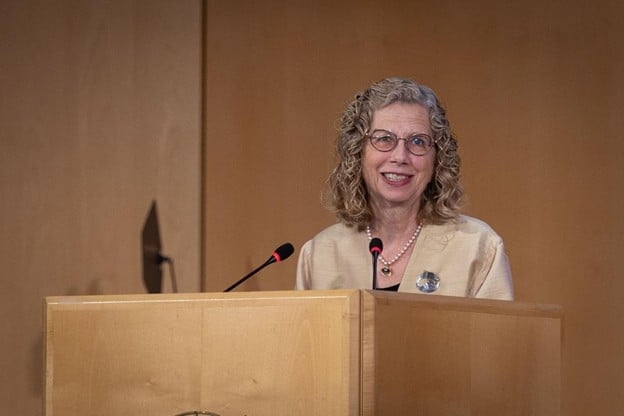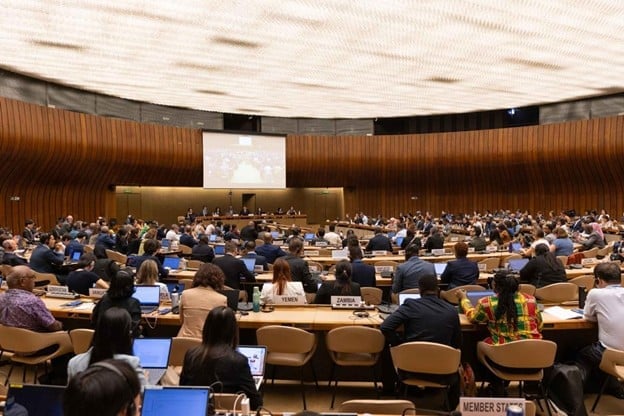November 8, 2025 | 23:17 GMT +7
November 8, 2025 | 23:17 GMT +7
Hotline: 0913.378.918
November 8, 2025 | 23:17 GMT +7
Hotline: 0913.378.918
This negotiation session on the global agreement on plastic pollution follows the first part of the fifth session (INC-5.1), which took place in Busan, Republic of Korea, in late 2024. The event marks a significant step forward in the roadmap toward developing a legally binding international instrument to address plastic pollution worldwide, one of the most pressing environmental challenges of the 21st century.
The conference brings together nearly 3,000 delegates from 180 countries, along with more than 400 international organizations and observers.

The INC-5.2 conference saw the participation of nearly 3,000 delegates from 180 countries, along with more than 400 international organizations and observers. Photo: Thuy Dung.
The Vietnamese negotiation delegation, led by the Ministry of Agriculture and Environment and including the Ministry of Industry and Trade, the Ministry of Foreign Affairs, and the Ministry of Justice, attended the INC-5.2 conference and actively participated in discussions within the Contact Groups. As a developing country affected by plastic pollution, Vietnam clearly demonstrated its commitment to contributing to the process of formulating an effective global legal instrument that is also suited to the practical conditions of developing nations.
During the working sessions, the Vietnamese delegation contributed opinions on key issues such as defining the scope of the Agreement, adopting a life-cycle approach to products, establishing mechanisms for technical and financial support, and incorporating the principle of a just transition. Vietnam also stressed the importance of international cooperation, technology sharing, capacity-building, and financial assistance to help developing countries effectively implement their treaty commitments.
In his opening remarks at the session held on August 5, 2025, at the United Nations headquarters in Geneva, Switzerland, Chair of the Negotiating Committee Mr. Luis Vayas affirmed that “the common good is not in opposition to national interests,” urging countries to ensure harmony between the two. He emphasized that, in the face of increasingly severe and global environmental challenges, nations must demonstrate genuine cooperation, work towards a legally binding and enforceable agreement, and ensure inclusivity and flexibility to adapt to future changes.

Mrs. Inger Andersen, Executive Director of the United Nations Environment Programme (UNEP), called on member states to uphold their sense of responsibility and work closely together to soon reach consensus on a legally binding instrument, reflecting the strong determination of the international community in addressing plastic pollution. Photo: Thuy Dung.
Mrs. Inger Andersen, Executive Director of the United Nations Environment Programme (UNEP), highlighted the progress made in the period between the two sessions and underscored the urgent need to translate political commitments into concrete actions. She called on member states to continue upholding their sense of responsibility and working closely together to swiftly reach consensus on a legally binding instrument - one that would demonstrate the international community’s strong determination to address plastic pollution.
Mrs. Katrin Schneeberger, Director of the Swiss Federal Office for the Environment, urged countries to fully utilize the cooperative spirit and multilateral dialogue in Geneva to develop an inclusive Agreement grounded in scientific evidence and capable of practical implementation.
Immediately after the morning’s plenary opening, the Negotiating Committee moved into Contact Group meetings, based on the agenda agreed upon in the previous session. Thematic discussions continued until 10-11 p.m. the same day, reflecting the serious and urgent working spirit of participating delegations, while also revealing the considerable pressure posed by the vast volume of negotiation content and the shrinking time available to produce a consolidated draft text.
Within the Contact Groups, delegations focused on key elements of the Agreement, including concepts and definitions, scope of application, control of plastic emissions and leakages, financial mechanisms, overarching objectives, and implementation principles. These are all core, structural issues that directly affect the level of commitment, feasibility of implementation, and the balance of interests among countries at different stages of development. At this point, significant differences remain between parties, particularly concerning the role of plastic production, allocation of financial responsibilities, and provisions for technical assistance.

The INC-5.2 session is expected to help create a breakthrough, laying the groundwork for countries to finalize the Global Agreement on Plastic Pollution, with the ambition of its adoption by the end of 2025 in line with the roadmap set out at the United Nations Environment Assembly (UNEA). Photo: Thuy Dung.
The initial working process also reflected the sense of responsibility and goodwill for cooperation shown by most delegations, clearly demonstrated through their willingness to work beyond official hours and actively propose compromise solutions to advance the pace of negotiations. The effective operation of the Contact Groups throughout this session is considered an important foundation for gradually narrowing differences, clarifying outstanding issues, and building a consensus framework for drafting a consolidated text to be submitted for the Committee’s adoption.
Discussions centered on key issues such as the degree of control over production, allocation of financial responsibilities, the rights of vulnerable groups, and mechanisms for implementation support, all of which continued to highlight the complexity and multi-dimensional nature of the negotiation process. Against this backdrop, the INC-5.2 session is expected to help create a breakthrough, laying the groundwork for countries to finalize the Global Agreement on Plastic Pollution, with the ambition of its adoption by the end of 2025 in line with the roadmap set out at UNEA.
The conference will continue until August 14, 2025.
Translated by Kieu Chi

(VAN) MAE's joint working group will implement the EUDR Adaptation Action Plan, starting with the comprehensive national database development and management.

(VAN) Developing a clean energy ecosystem is a key solution for controlling pollution and achieving the Net Zero emissions target.

(VAN) At the forum 'Green Energy - Clean City,' experts and businesses emphasized that Viet Nam needs a coordinated roadmap aligning emission control with the standardization of clean fuels.

(VAN) Hanoi is developing a roadmap for emission control, green transport, and clean fuel use, aiming to become a low-emission and sustainable city.

(VAN) Authorities in Slovenia have uncovered the presence of paracetamol in non-processed pickles in acid from India.

(VAN) The Ministry of Agriculture and Environment of Vietnam has signed a new Memorandum of Understanding (MOU) with WWF, focusing on nature conservation, green development, and sustainable emissions reduction.

(VAN) Viet Nam's strong commitment to green energy, supported by businesses, scientists, and the public, is a shared national mission.